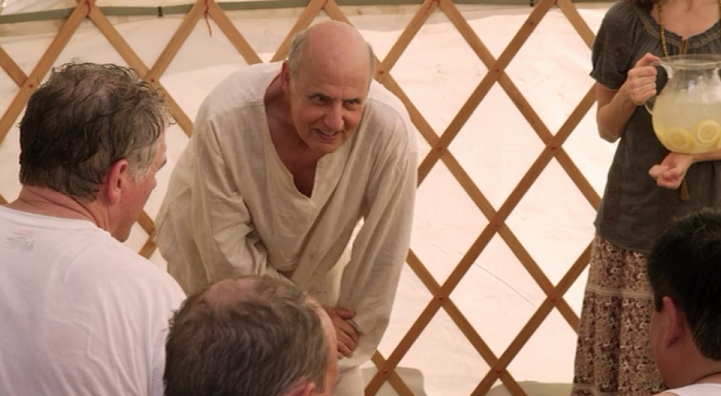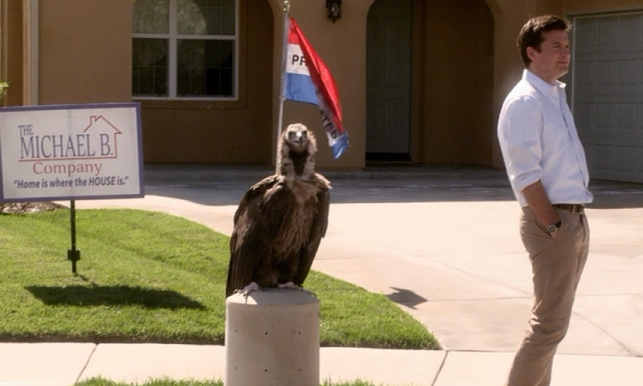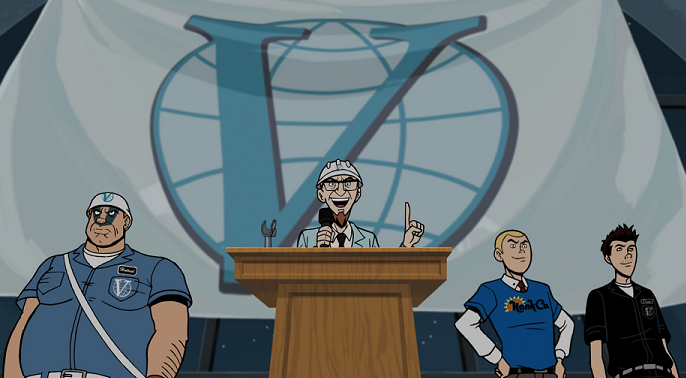Before I got a chance to watch these episodes, I made a point of avoiding spoilers. One thing I did read from folks who had gotten a head start on me, though, was that the first few episodes were a bit exposition-y…stick with them, however, and things only get better.
Watching these first few episodes, then, actually had me feeling like I might fall in love with this season. After all…I liked them. I had some reservations, but they were nothing insurmountable. And if they only got better? Well, then this really could have been something magical.
Looking back, though, I think the first few episodes are actually the best the season has to offer. They at least succeed in telling their own smaller stories, and give us tantalizing glimpses of what’s to come…rather than the clumsy, cheap editing that takes its place later.
I’m thinking specifically of something “Borderline Personalities” does perfectly, which itself feels like the fulfillment of a promise you didn’t even realize you’d entered into. In the first episode, “Flight of the Phoenix,” we see Michael talking to George Sr. and Lucille in the penthouse. The elder Bluths announce they are getting a divorce and the camera pulls back to reveal Buster, shrieking in agony.
That’s funny enough on its own, so when “Borderline Personalities” returns to it we remember what happened. In fact, it seems like we’re just being shown the same clip again, but this time it continues a little further, and some sexual details are spilled causing the camera to pull out again, this time revealing GOB on the couch, groaning in nausea.
It’s funny all over again, and probably even moreso this time because this additional moment is so unexpected.
It works very well, and it serves as the proof of concept for exactly the kind of comic rhythm Hurwitz should have been — and probably was — shooting for with this entire season. When you have overlapping episodes like this, the concern is always going to be that the gimmick will outweigh the writing. Here, Hurwitz shuts us up fast. Not only will these scenes overlap, but when they do you’ll find more to like about them every time.
Unfortunately this is about the only time in the season that it works. We return to the penthouse again (and to the Queen Mary debacle, and to Cinco de Cuatro) and each time learn that somebody else is present, or hear a bit more of somebody else’s conversation, but it doesn’t feel as natural and well-earned as it does here. It does feel gimmicky, and when we lose clever reveals in favor of simply editing away in the middle of a conversation so that we’ll have something left to show later, I’m pretty confident in saying that it outweighs the writing as well.
That’s actually the worst thing I can say about “Borderline Personalities;” it makes the less graceful maneuvers carried out by the rest of the season look that much worse in comparison.
The story this time around is about as self-contained as Michael’s was. We dip into other territory, and we absolutely end the episode on a note that suggests we have a long narrative ahead of us, but we follow one character through a small journey (a doomed business plan, just like Michael) and the consequences flow smoothly from the character’s actions. As I mentioned in the “Flight of the Phoenix” review, this shouldn’t be something that specifically needs to be praised, but in light of what’s to come it’s absolutely worth clinging to while we still have it.
George Sr.’s story involves his twin brother Oscar, unsurprisingly. In an effort to double dip on a desert land investment (which he only made in the first place in order to put the squeeze on the US Government) George Sr. hosts a spiritual getaway for CEOs and other businessmen. The centerpiece of the experience is an hour and a half in a mud hut, where everybody sits and sweats until they begin to hallucinate…at which point George Sr. delivers a rousing a speech and offers them inner peace (and bottomless lemonade) for a mere $15k.
Of course it’s actually Oscar sweating it out in the hut, which is how George Sr. keeps his energy high enough to deliver the sales pitch. And like Michael’s plot from the last episode, it’s silly enough to be funny, but absolutely true to the character.
We also get introduced to a few guest characters who will be sticking around, for better or worse, for the rest of the season. There’s Dr. Norman, a disgraced anesthesiologist whose “Nobody cares about the part of the oath you kept” makes him sound like he’s going to be a far more interesting character than he turns out to be*, and his better half China Garden, who gets a paragraph all of her own…
I don’t understand the joke with China Garden. She shares a name with an actual Chinese restaurant that turns up later in the season, so George Sr. confusing her with it when they’re introduced doesn’t even qualify as a joke. She’s shrill and argumentative, which would be fine, I guess, if that was just a quirk of her character…but later on we meet another group of Asians who all behave the same way, which suggests something very problematic that doesn’t even deserve to be unpacked. Taken in conjunction with what I referred to as “the casual racism” in my review of the previous episode, I have to wonder how “casual” it really is.**
Thankfully we’re also introduced to Heart-Fire, played wonderfully by Mary Lynn Rajskub. She’s another one-joke character (she communicates by thought…and not very well) but that joke evolves many times over, and always in a new and funny way. It’s the difference between finding comic mileage in a joke, and leaving a joke where it began…which, sadly, is what happens to the rest of the characters we meet this time around. Heart-Fire returns, and the joke continues to evolve. She’s great, but I wish she wasn’t such a glaring exception to the season four norm.
With these first two episodes, I feel like Hurwitz is just about where he wants to be. He’s creating isolated pieces that, ultimately, interlock and reveal something greater. We get a sense of that with the penthouse scenes, and while both stories are left wide open, they also feel like they advanced neatly to their natural breaking points.
That’s all about to change, and that’s unfortunate. Because these really should be the weakest episodes. It really should only get better from here. Instead, we’re just left with a grand narrative promise destined to remain unfulfilled.
Episode 2: “Borderline Personalities”
Central Character: George Sr.
Other Family Appearances: Michael, Lucille, Buster
Most Clumsy Reference to Original Run: Only two overt references by my count, and both were pretty good. In one, Lucille 2 dresses her adopted Hispanic son in the wig and freckles we remember from the Spanish soap operas in season one…it’s a nice visual callback. In the other, George Sr. and Lucille discuss legal issues with a young Barry, who tells them a husband and wife can’t be charged for the same crime. The “We have the best ****ing lawyer!” reversal is a perfect example of how to do these things right.
Scene That Most Needed Tightening: Buster helping Lucille smoke. The mumbled dialogue suggests it might have been conceived as a quick cutaway or something to be overdubbed with narration, but as it stands it really slows down the pace of an already sluggish episode.
Best Line / Exchange:
GEORGE SR.: You know, I shouldn’t judge. Because you have friends and I…I envy that.
OSCAR: You’re welcome to my friends, brother.
GEORGE SR.: …I don’t want these.
—–
* The problem with Dr. Norman is the problem we’ll have more or less across the board this season: the supporting characters are painfully one-note. It’s even worse when measured here against returning guest stars like Henry Winkler and Ed Begley Jr…they played characters that were arguably one-note as well, but the performances all suggested something richer…a more complete personality than we needed to see. They were never the cartoon characters we get inundated with this time around, and that’s a problem with both the performances of the new characters and the writing behind them.
** It’s also a problem when we suddenly populate this universe with caricatures because it rips the character distinctions of the past three seasons away. If everyone on Earth is a bumbling, screaming idiot — and there are certainly enough new characters this season to suggest that — then there’s no comedy to be had when we encounter someone who’s supposed to stand out as a bumbling, screaming idiot. Gene Parmesan was funnier because we had Ice to compare him to. Barry’s incompetence is easily measured against the much more capable (sorry, professional) Wayne Jarvis. Even GOB has Tony Wonder. We need to see people who are good at what they do as well, otherwise the idiocy becomes meaningless. In fact, forgive me for this, but if Rita were introduced in season four, her retardation wouldn’t distinguish her at all. That might sound crass, but think about it for a moment.


